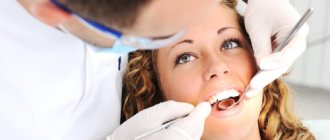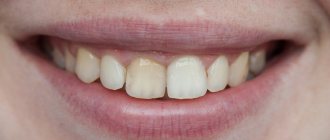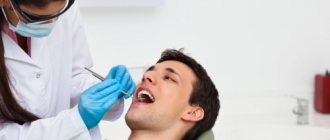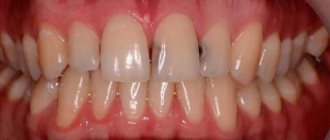If your teeth involuntarily clench and grind during your sleep, you need to understand that these are clear signs of a disease such as bruxism.
Timely treatment is necessary to prevent the development of other diseases and complications. Bruxism can cause: tooth wear, dysfunction of the temporomandibular system, periodontitis, frequent headaches, etc.
The difficulty here is that such treatment will only be effective if there is an integrated approach. In addition to dental treatment, psychotherapeutic and physiotherapeutic treatment will be required, as well as massage and the use of protective caps.
Bruxism - what is it
Uncontrolled grinding of teeth, resulting from spasms of the masticatory muscles. If you come across texts about the Carolini phenomenon, odonterism, “teeth grinding disease” - they are all about bruxism, and the names listed are synonyms of bruxism. Translated from ancient Greek, bruxism means grinding.
Dentists distinguish two types of this disease.
- Directly grinding, that is, the friction of the teeth against each other.
- Clanching is a static clenching of teeth that occurs without friction.
Bruxism is often chronic, causing discomfort to a person for many years. If left untreated, it results in complications: problems with the temporomandibular joint, chronic stress, and abrasion of tooth enamel.
It is necessary to distinguish between childhood and adult bruxism - they have many significant differences. Here we will look in detail at the course of this disease in adults. There is a separate article on childhood “teeth grinding disease”.
Night grinding of teeth.
A person does not realize that he grinds his teeth when he sleeps. Doesn't wake up from gritting her teeth and may not be aware of the problem at all. Only his relatives can talk about it.
Daytime teeth grinding.
This type of bruxism is already recognized by a person. But clenching of teeth occurs involuntarily and cannot be controlled. During daytime bruxism, a person feels discomfort, which causes periodic strong tension in the facial muscles.
General recommendations
- At the first signs of bruxism, it is recommended to consult a specialist - a neurologist or psychiatrist.
- Before going to bed, forced relaxation is done. Gradually it will become a habit.
- During the day you need rest, maintaining a good mood.
- Maximum exclusion of stressful situations.
- Before going to bed, the jaw is subjected to heavy load. You can chew hard vegetables and fruits (pears, carrots). Well, the jaw gets tired of the seeds.
- You can take sedatives and soothing tea (only after consulting a doctor).
- It is important to combine a daily routine where work and rest alternate.
- During the year, vacations, sports, and leisure time in the fresh air are required.
The most common consequences of teeth grinding in adults
- Increased tooth wear. Constant friction causes teeth to lose their natural height. In general, this is a natural process: with age, all people's teeth become a little shorter. But with bruxism this happens much faster. Plus, constant grinding of teeth results in frequent loss of fillings, the appearance of chips and roughness.
- Pain in the mouth. It appears due to the fact that during bruxism a person often “bites” his cheeks. Wounds and abrasions appear that do not have time to heal.
- Headache, nagging pain in the neck, ringing in the ears, dizziness. If the cause of these neurological symptoms cannot be substantiated by other diseases, then there is a high probability that these are the consequences of constant teeth grinding.
- Drowsiness, irritability, general “weakness,” fatigue. All this can appear if a person suffering from bruxism has trouble sleeping at night due to constant clenching of teeth during sleep.
A person himself can rarely understand that the cause of his health problems is bruxism. The diagnosis can be made only with the help of a special study - electromyography.
Treatment and prevention
Dentistry suggests constantly wearing a mouthguard - a custom-made rubber structure that protects teeth from abrasion and loosening.
magnesium, calcium and B vitamins, light sedative and hypnotic infusions in order to calm the nervous system Before going to bed, you can apply a warm, damp towel to relieve tension, and undergo massage sessions of the chin and jaw system.
You should avoid eating foods that stimulate the nervous system (chocolate, coffee, strong tea, energy drinks, chewing gum).
Psychological and physiological ways to overcome bruxism
- You can learn autogenic training methods, breathing exercises, meditation, relaxation and stress relief.
- You should make a list of your favorite calming activities that allow you to relax and switch your attention from worries (to form a so-called “ bank of positive emotions ”). This could be long walks in nature, playing a suitable sport (swimming, running, cycling, yoga or qigong), taking warm relaxing baths with herbal decoctions, listening to music, chatting in a pleasant company, watching interesting films or programs, reading books, traveling to new places.
- A visit to a psychologist or psychotherapist will help the patient speak out, understand himself, internal conflicts, frequent mood swings, overcome depression and find spiritual harmony and balance.
Patients with bruxism are often torn between reason and emotions, between “want” and “should.” As a result, a person seems to eat and strive to destroy himself, grinding his teeth in his sleep when control over the psyche is weakened. Bruxism manifests itself as a destructive form of auto-aggression (aggression that has not found a way out). And the task of the psychologist is to recognize and bring out, work through and make conscious to the patient these suppressed elements of his psyche (including through the use of hypnotic techniques). Find acceptable options for expressing suppressed emotions, allow the patient to realize himself, turning aggression into a constructive direction.
Also, with the help of a psychologist, you can learn useful relaxation skills, for example, according to Jacobson . This technique consists of alternately working with different parts of the body - tensing and then relaxing the muscles, including the maxillofacial muscles.
In case of an excess of sexual energy, it will be useful to think about having a partner and regularly realizing your sexual potential, which in itself brings positive emotions and relaxes.
Why do adults clench their teeth?
There is no clear answer. However, research and observations have allowed doctors to identify several hypotheses for the occurrence of bruxism.
- Bad habits
Sometimes, in order to concentrate, some people chew on a pen or toothpick. Over time, this action can become a conditioned reflex. And when a person needs to concentrate, he involuntarily clenches an imaginary toothpick between his teeth. This may explain the occurrence of teeth grinding during sleep. - Nervous stress
Often adults clench their teeth when they want to hold back in a stressful situation. If this happens for a long time, the body may develop an uncontrollable habit: the slightest overexertion - we clench our teeth tightly. This is another version of the appearance of bruxism at night in adults. - Neurological diseases
Also, people suffering from a number of neurological diseases often grind their teeth at night: epilepsy, tremor, enuresis, Huntington's disease, Parkinson's disease - all of them are characterized by such a symptom as bruxism. - Insomnia
If a person does not sleep normally for a long time, often wakes up at night, is more often in a state of shallow rather than deep sleep, he clenches his jaw uncontrollably because he begins to get nervous because he cannot get a good night's sleep. - Pathologies of the dental system
Bruxism can be caused by a pathological bite: it causes an uneven distribution of the load on the teeth. For treatment in this case, read the article “Bite correction in adults.” Also, the cause of clenching teeth at night may be their overcrowding. With this disorder, the teeth do not close completely. In addition, dentists studying the phenomenon of bruxism note that its cause may be the desire of people to “shorten” fillings or dentures that were installed incorrectly: a person tries to “erase” them and often begins to close their jaws tightly and move them relative to each other . Over time, this can become an unconscious habit.
For quite a long time, bruxism was considered a symptom of helminthic infestation. Scientific research has not confirmed this theory.
Diagnostics
Bruxism is less common in adults than in children. To begin adequate therapy, a comprehensive examination should be carried out, which will make it possible to find the root cause of this problem.
Psychotherapeutic diagnostics
The method allows you to find out why teeth grinding appeared and find the causes of the pathology at the psychosomatic level. An experienced psychotherapist assesses the extent of the progression of the disease and assists in changing the response in the event of stressful situations, since behavioral processes most often spur painful symptoms.
Electromyographic research method
Using electromyographic diagnostics, the functioning of the muscles of the masticatory apparatus is assessed at rest, as well as during active work, which makes it possible to better assess the nature of the pathology.
Electromyography reveals dental errors: inadequately selected dentures, mistakes during restoration procedures. Various studies help not only to make a diagnosis, but also to assess the possible consequences of the pathology, and provide an understanding of how to cure bruxism in adults and children in the shortest possible time.
Psychosomatic explanation of bruxism
Now one of the most common versions of teeth grinding is psychosomatic. That is, bruxism is the result of hidden experiences, long-suppressed emotions, complexes, and fears. All this can cause spasm of the chewing muscles. There is also an assumption that bruxism accompanies a number of mental disorders. Thus, scientists from Germany studying “adult” bruxism conducted a study, the results of which indicate that teeth clenching is directly related to chronic depression.
ATTENTION!
Confusion of the soul is the main cause of teeth grinding. This was the opinion of Hippocrates. And he was probably not far from the truth.
Causes of the disease
There is no single point of view on the origin of the disease. The leading links in developmental mechanisms (genetic, neurological, endocrine) have not yet been sufficiently studied.
It is believed that the main role in the formation of adolescent bruxism belongs to a violation of nervous regulation caused by stress and maintaining a state of mental and emotional tension. An imbalance of stress hormones increases the convulsive readiness of the brain, disrupts sleep structure, and leads to hyperactivity of the masticatory muscles. Unfavorable backgrounds include birth, traumatic brain injury, heredity, and severe neuroinfections.
What procedures can a dentist not perform for bruxism?
Chronic teeth grinding often makes it impossible to carry out dental treatment: for some types it is an absolute contraindication, for others it is a relative one. It all depends on the severity of bruxism.
Treatment with braces.
For bruxism, dentists prefer to replace it with mouth guards. They are softer than braces and do not injure the mucous membranes, gums and tongue, which often happens if a person regularly clenches his jaw tightly. In addition, braces often break due to bruxism.
Installation of ceramic crowns
undesirable for “teeth grinding disease.” Despite the fact that modern dental ceramics are quite durable, they still cannot withstand the increased pressure that occurs during bruxism, and the ceramic crown is destroyed.
For implantation
Bruxism is considered an absolute contraindication, since the risk is too high that due to constant clenching of the teeth, the implant will become loose and fall out.
Restoration with lumineers, veneers, composites
It is ineffective for bruxism. It can be done, but it will not be possible to avoid mechanical damage to mini-prostheses. This has been recorded over many years of observations.
Should adults treat bruxism?
Teeth grinding is an unpleasant disease, but its severity for the patient, of course, cannot be compared with, say, a complete absence of teeth and caries. However, the long-term consequences of bruxism are still unpleasant. It may interfere with prosthetics, implantation, and orthodontic treatment with braces, if necessary. In most cases, you will simply need to get rid of uncontrollable teeth clenching, but this will require additional time and money. But, in general, we are lucky that we do not live in the Middle Ages - then the Inquisition interpreted gnashing of teeth as a symbol of connection with the devil and executed people. Today we have all the means to get rid of this disease. The main thing is not to delay your visit to the dentist and start treatment on time.











